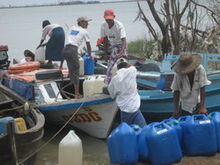This article needs to be updated.(December 2016) |
| Merged into | Save the children in 2013 |
|---|---|
| Formation | 1993 |
| Founder | Christopher Besse, Nicholas Mellor and Mark Dalton [1] |
| Dissolved | 16 June 2024 [2] |
| Type | International charity |
| Focus | Primary Care, Public Health Education, Disaster Relief, International Health, Disease prevention, and Epidemiology |
| Location | |
Area served | Global |
| Method | Research, Emergency Health Guidelines, Infrastructure |
| Employees | Around 4,000 [3] |
| Website | www.merlin.org.uk |
Formerly called | Merlin Board Limited [3] |
Medical Emergency Relief International (MERLIN) was a British international nongovernmental health charity that provided medical experts for global emergencies. Operating in over 40 countries, it focuses on medical aid, disease prevention, and healthcare infrastructure rebuilding. In 2013, MERLIN merged with Save the Children with all of its operations having ceased or been transferred by April 2016. The charity was dissolved on 16 July 2024.




